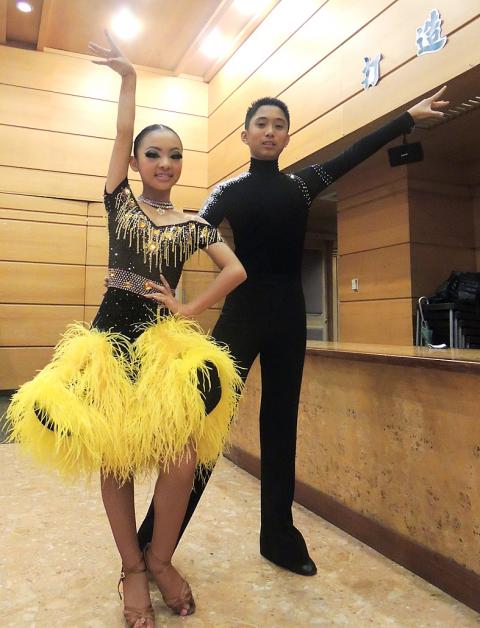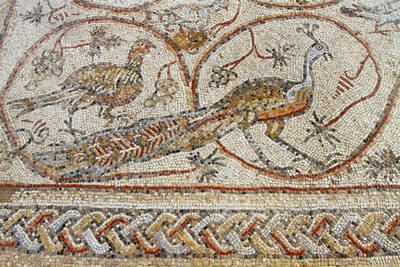Together, they are Latin dance champions, but Jack Tai (戴士峻) and Vivian Kuo (郭子微) are not best friends in real life.
“He is a stinky boy,” says Kuo, 11, of her 13-year-old dance partner.
On the dance floor, though, they have a partnership that appears effortless. Tai exudes confidence as he leads her into a series of acrobatic turns on high heels. She ends the routine with arms outstretched, creating a visual flourish that extends down to her fingertips.

Photo: Enru Lin, Taipei Times
They are good — two of the best — and have represented Taiwan on the ballroom dance competition circuit around the world, most recently at the 2013 World Dancesport Federation’s Kings Cup International Open in Thailand. At home, they are currently ranked No. 1 in the four-dance Latin category for pairs under-16.
They are now training for one of their biggest competitions to date — the novice Latin championship at the Asian Dance Tour Taipei Open.
The Taipei Open is a major ballroom dancing competition overseen by the World Dance Council (WDC) and organized by the Taiwan International Sport Dance Development Association (中華民國舞蹈發展協會).
This year’s event will host a record-topping 250 pairs from Taiwan, plus 141 pairs from 31 countries, vying for a total of US$102,400 (NT$3.3 million) in rounds judged by the WDC.
Contestants are big names including the globe’s top 24 professional ballroom dancers, but also seniors and children as young as 10.
DANCER TODAY, DOCTOR TOMORROW
Joanna Liu (劉怡微), 13, is a local favorite to win in this year’s novice competition in the modern category.
International ballroom dance is broken down into two categories: modern and Latin. Latin is feistier, comprising samba, rumba, cha-cha, paso doble and jive. Modern has waltz, the Viennese waltz, tango, foxtrot, and quickstep.
“I’m doing modern, which I really prefer. See, I have these flat duck feet so I despise high heels — you need major heels for Latin,” Liu says.
At a photo shoot on Tuesday for Taipei Open, she strikes some poses for the camera and then retreats to a table with her lesson book. She wants to become a doctor, she says, because she wants to have the know-how to diagnose her own ailments.
“I have this problem,” Liu says. “I research diseases and think that they apply to me, but some of that information is fake. I want to be a doctor because then I would have the correct data.”
Liu also wants to perfect the waltz, an atypical pick for a young ballroom dancer. Among the youth set, waltzes are a bit unpopular, considered old-fashioned, tiring and uncool.
“Still, I like it because the tempo is slower and so familiar,” she says. “Most beginners in ballroom start with waltzes, so I have been doing it for nine years.”
The teen took her first ballroom dancing class when she was four years old. She’s currently Taipei Open’s secondary school division champion in the modern category, but she wasn’t always serious about dance.
“My parents are ballroom dancing instructors and my grandfather also did ballroom dance, so when I was little I saw everybody dancing. When I started, I had one class a week with a lot of other kids and it was just fun and I didn’t care about the results. After a while, however, I realized that I have my reputation to protect and I should apply myself,” she says.
LONG LONELY HOURS
For the past few years, she has been sticking to a strict regimen.
“If it’s a long holiday, I practice every day,” she says. “If it’s a week with school then I practice some hours three days a week.”
Like Kuo and Tai, who she knows through the national ballroom competition circuit, she says that ballroom dance is mostly long hours of being alone. The real work is often done without a partner, repeating pieces of program in front of a big mirror, circling the floor with hands frozen in the air for hours at a time.
“Ballroom dancing isn’t pure fun. It can be — my sister does it just for fun, but she doesn’t compete. If you compete you have to be serious and do it even when it’s boring,” she says.
But the rewards, though intermittent, do exist. There are moments when she notices improvement.
“Also, dancing is very relaxing,” she says. “I have mild asthma so by the end of routines, I’m little tired, but before that I like it and feel like I’m in the zone.”
The 2014 Asian Dance Tour Taipei Open preliminaries take place Monday at 5F, Taipei Municipal Dean Vocational High School activity center (台北市大安高工活動中心). Finals are on Feb. 28 at the Taipei Arena (臺北小巨蛋).

Next week, candidates will officially register to run for chair of the Chinese Nationalist Party (KMT). By the end of Friday, we will know who has registered for the Oct. 18 election. The number of declared candidates has been fluctuating daily. Some candidates registering may be disqualified, so the final list may be in flux for weeks. The list of likely candidates ranges from deep blue to deeper blue to deepest blue, bordering on red (pro-Chinese Communist Party, CCP). Unless current Chairman Eric Chu (朱立倫) can be convinced to run for re-election, the party looks likely to shift towards more hardline

Sept. 15 to Sept. 21 A Bhutanese princess caught at Taoyuan Airport with 22 rhino horns — worth about NT$31 million today — might have been just another curious front-page story. But the Sept. 17, 1993 incident came at a sensitive moment. Taiwan, dubbed “Die-wan” by the British conservationist group Environmental Investigation Agency (EIA), was under international fire for being a major hub for rhino horn. Just 10 days earlier, US secretary of the interior Bruce Babbitt had recommended sanctions against Taiwan for its “failure to end its participation in rhinoceros horn trade.” Even though Taiwan had restricted imports since 1985 and enacted

Enter the Dragon 13 will bring Taiwan’s first taste of Dirty Boxing Sunday at Taipei Gymnasium, one highlight of a mixed-rules card blending new formats with traditional MMA. The undercard starts at 10:30am, with the main card beginning at 4pm. Tickets are NT$1,200. Dirty Boxing is a US-born ruleset popularized by fighters Mike Perry and Jon Jones as an alternative to boxing. The format has gained traction overseas, with its inaugural championship streamed free to millions on YouTube, Facebook and Instagram. Taiwan’s version allows punches and elbows with clinch striking, but bans kicks, knees and takedowns. The rules are stricter than the

Nearly three decades of archaeological finds in Gaza were hurriedly evacuated Thursday from a Gaza City building threatened by an Israeli strike, said an official in charge of the antiquities. “This was a high-risk operation, carried out in an extremely dangerous context for everyone involved — a real last-minute rescue,” said Olivier Poquillon, director of the French Biblical and Archaeological School of Jerusalem (EBAF), whose storehouse housed the relics. On Wednesday morning, Israeli authorities ordered EBAF — one of the oldest academic institutions in the region — to evacuate its archaeological storehouse located on the ground floor of a residential tower in